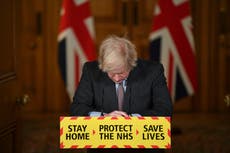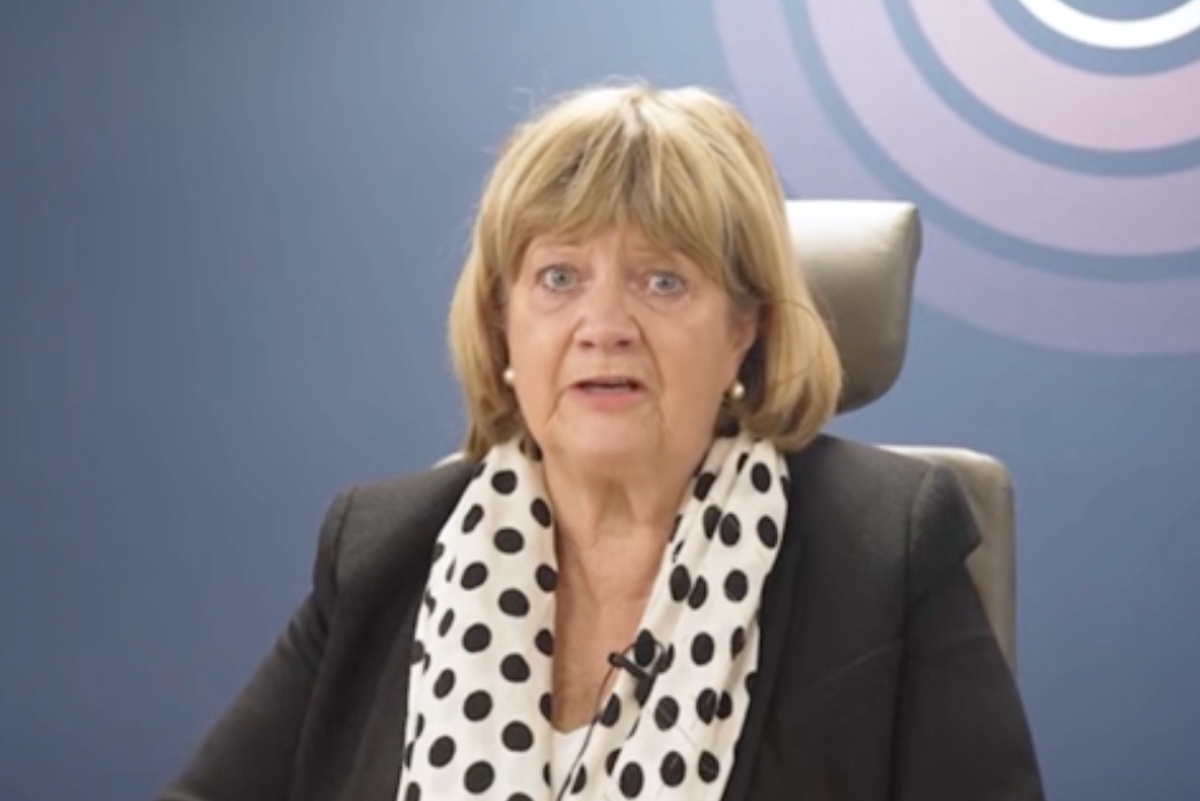- News
- UK
- Home News
Damning report finds more than 20,000 lives could have been spared over spring and summer 2020 had restrictions started just seven days earlier
Tara Cobham,Caitlin Doherty,Kate Devlin,Shweta SharmaFriday 21 November 2025 07:00 GMTComments
 CloseCovid inquiry: Government failure to anticipate or plan lockdown led to 23,000 deaths
CloseCovid inquiry: Government failure to anticipate or plan lockdown led to 23,000 deaths
Get the free Morning Headlines email for news from our reporters across the world
Sign up to our free Morning Headlines email
Sign up to our free Morning Headlines email
 Email*SIGN UP
Email*SIGN UPI would like to be emailed about offers, events and updates from The Independent. Read our Privacy notice
The UK’s response to the coronavirus pandemic was “too little, too late”, the chairwoman of the UK Covid-19 Public Inquiry has said.
In a statement read following the release of the inquiry’s latest damning report, Baroness Heather Hallett said: “I can summarise my findings of the response as too little too late.
“All four governments failed to appreciate the scale of the threat or the urgency of response it demanded in the early part of 2020, relying in part on misleading assurances that the UK was properly prepared for a pandemic.”
The bombshell report found Boris Johnson and Dominic Cummings reinforced a “toxic and chaotic culture” at the heart of Number 10.
Other conclusions included that a total lockdown could have been avoided in 2020 if restrictions had been introduced sooner, and that more than 20,000 lives could have been spared across that spring and summer had the orders come just seven days earlier.
The findings were published in hundreds of pages across two volumes on Thursday afternoon, covering government decision-making from when the virus first emerged in early 2020 through to early 2022, and painting a picture of chaotic decision-making at the heart of government.
Recommended Toxic No 10 culture, unnecessary deaths and failed children: Key takeaways from the Covid Inquiry report
Toxic No 10 culture, unnecessary deaths and failed children: Key takeaways from the Covid Inquiry report Government’s actions during Covid-19 pandemic ‘too little, too late’
Government’s actions during Covid-19 pandemic ‘too little, too late’ Covid chaos in Boris Johnson’s government led to 23,000 deaths, damning inquiry finds
Covid chaos in Boris Johnson’s government led to 23,000 deaths, damning inquiry finds The true cost of Boris Johnson’s Covid incompetence is now clear for all to see
The true cost of Boris Johnson’s Covid incompetence is now clear for all to see This shameful Covid report leaves no way back for Boris Johnson
This shameful Covid report leaves no way back for Boris Johnson
Key Points
- Covid inquiry chair summarises findings as 'too little too late'
- Johnson and Cummings presided over 'toxic and chaotic culture' at No 10, Covid Inquiry finds
- Sir Keir Starmer says public services still 'not fully recovered' from pandemic
- Boris Johnson 'put his political reputation ahead of public safety', Covid bereaved say
- Sturgeon 'stands by highly precautionary approach'
- What evidence on Boris Johnson and his team did the inquiry hear
Covid probe calls for reform to help the UK be better prepared for pandemics
The human and financial cost of the Covid-19 pandemic will be “in vain” unless lessons are learned from the crisis, the chairwoman of the pandemic probe has said.
Baroness Heather Hallett’s report into political decision making during the crisis acknowledges that politicians were faced with “unenviable choices” and says there were “few, if any, easy decisions to make”.
But the report, which totals more than 800 pages, sets out how lives could have been saved and lockdowns may have been avoided if different decisions were taken.
“I can summarise my findings of the response as ‘too little, too late,’” Lady Hallett said in a statement.
“The Inquiry has therefore identified a number of key lessons learned to inform the response to a future pandemic.
“In all, I make 19 key recommendations that I believe will better protect the UK in any future pandemic and improve decision-making in a crisis.”
Tara Cobham21 November 2025 07:00Northern Ireland’s first minister calls report an 'important milestone'
Northern Ireland’s first minister, Michelle O’Neill, has welcomed the publication of the Covid Inquiry’s second report, describing it as an “important milestone” in the long process of recovery after the pandemic.
O’Neill, who served as deputy first minister during Covid, thanked the inquiry chair, Baroness Hallett, and her team for their work, saying the findings would be vital in shaping how Northern Ireland prepares for future emergencies.
“Covid was an unprecedented global emergency and this report will provide further lessons from the experience at all levels of society,” she said. “Those lessons must inform our preparedness for, and response to, any future pandemic or society-wide emergency.”
She also offered her thoughts to the families who lost loved ones, saying they remain “very much” at the forefront of her mind.
Shweta Sharma21 November 2025 06:30Watch: Closing schools was a 'nightmare idea', Boris Johnson tells Covid inquiry
Closing schools was a 'nightmare idea', Boris Johnson tells Covid inquiryTara Cobham21 November 2025 06:00Dominic Cummings launches blistering attack on Covid Inquiry
Dominic Cummings has issued an extraordinary statement ahead of the publication of this afternoon’s UK Covid-19 Inquiry report, accusing the process of “coverups”, “rewriting history” and operating like “Inspector Clouseau”.
In a lengthy post, the former No10 adviser said he declined to take part in the Maxwellisation process – the stage where individuals are shown criticisms in advance – claiming it reflected “Insider corruption”.
He said he had never hired lawyers to deal with the inquiry and maintained he had never broken any rules or been investigated by police over any matter.
Cummings alleged that the inquiry has allowed “senior scientists to claim under oath” that they held views in early 2020 which contradict their own public remarks at the time, accusing the process of enabling a “vast rewriting of history”.
Cummings further accused the inquiry of failing to gather statements from “many crucial people”, including what he said were almost all of the junior women working in Downing Street at the time.
He alleged the inquiry has not properly examined official emails and that many documents were deleted by the Cabinet Office “accidentally or on purpose”. He also said key material concerning intelligence advice on the possibility of a lab leak was withheld from the inquiry chair.
Shweta Sharma21 November 2025 05:30Scottish Government ‘had no real strategy’ for Covid in early 2020 – inquiry
The Scottish Government “had no real strategy” for the pandemic in the early part of 2020, the UK Covid-19 Inquiry has found.
Baroness Heather Hallett released a more than 700-page report on Thursday on the Government decision-making during the pandemic and found the devolved administrations’ response early in 2020 as being “inadequate” and too reliant on the UK Government.
The report found that it took too long for the issue to be escalated to the highest levels of Government, with the first mention to Scotland’s Cabinet coming at the end of January.
Read more here:

Scottish Government ‘had no real strategy’ for Covid in early 2020 – inquiry
The UK Covid-19 Inquiry also found the devolved administrations to be too reliant on the UK Government.Tara Cobham21 November 2025 05:00A family member says 'people like my mammy would’ve been saved'
Brenda Doherty, a leading figure in the Covid-19 Bereaved Families for Justice UK campaign, has said today’s report makes clear “why things need to change across the four nations”, stressing that “we as a society deserve so much better”
Doherty, whose mother, Ruth Burke, 82, died after contracting Covid-19, said she found the day “very emotional”.
“If we had a lockdown a week earlier, people like my mammy would’ve been saved,” she said, adding that there could be “no excuses” in any future pandemic. “It is up to those who are paid to, to look after every single member of society.”
 (Left to right) Martina Ferguson, Chanel Gillen, Jennifer Currie, Michael Lusty, Brenda Doherty, Trevor Patterson, Briege McAvoy, Lauren Mallon, Fiona Clarke and Catroina Myles with pictures of loved ones lost during the pandemic at PA Duffy & Co Solicitors offices in Belfast (Liam McBurney/PA) (PA Wire)
(Left to right) Martina Ferguson, Chanel Gillen, Jennifer Currie, Michael Lusty, Brenda Doherty, Trevor Patterson, Briege McAvoy, Lauren Mallon, Fiona Clarke and Catroina Myles with pictures of loved ones lost during the pandemic at PA Duffy & Co Solicitors offices in Belfast (Liam McBurney/PA) (PA Wire)She said the group’s focus now is ensuring the report’s recommendations are implemented across all administrations. “If they’re not, I want to know why – as do the families within our group.”
Shweta Sharma21 November 2025 04:30Covid deaths in Wales exacerbated by late restrictions, inquiry finds
Covid deaths in Wales were exacerbated by failed or late restrictions, a public inquiry has found.
Baroness Heather Hallett’s report on the response to Covid-19 found all four governments across the UK failed to appreciate the level of risk the UK faced when the pandemic hit.
The report highlights that, despite being advised on October 5 2020 that further restrictions were needed, the Welsh government did not implement a two-week “firebreak” until October 23.
From August to December 2020, Wales had the highest age-standardised mortality rate of the four nations.
Lady Hallett suggested a combination of failed local restrictions, a firebreak that was too late and the decision to relax measures too quickly all contributed to these deaths.
A number of Welsh Government witnesses, including Mark Drakeford, the former first minister, told the inquiry the provision of funding from the UK government had affected the Welsh government’s decisions on the timing and length of the firebreak.
This reasoning was dismissed in the report, noting that Mr Drakeford did not raise the question of additional economic support for a Wales-only lockdown.
He also told the inquiry he initially believed the UK government would be in charge of the country’s pandemic response.
However, the report states, “this did not mean that the Welsh Government should not have recognised the severity of the situation in January and February 2020 and taken its own steps to prepare for the arrival of Covid-19 in Wales”.
The report has renewed calls for a Wales-specific inquiry into the response of the Welsh government.
Tara Cobham21 November 2025 04:00Families says lives lost at an 'unprecedented, avoidable scale'
Families who lost loved ones during the Covid-19 pandemic have highlighted the "loss of life at an unprecedented, avoidable scale" after an official inquiry published its report into political decision-making during the crisis.
The second report of the UK Covid-19 Public Inquiry sets out how lives could have been saved and lockdowns may have been avoided if different decisions had been taken.
After the report was published, the Covid-19 Bereaved Families for Justice UK campaign group was critical of the actions of former prime minister Boris Johnson during the pandemic.
It said in a statement: "The evidence from the inquiry is clear, and while it is vindicating to see Boris Johnson blamed in black and white for the catastrophic mishandling of the pandemic, it is devastating to think of the lives that could have been saved under a different prime minister.
"We now know that many of our family members would still be alive today if it weren't for the leadership of Boris Johnson and his colleagues.
"As the report has found, the government's approach to the pandemic was undermined from the beginning - if Johnson had listened to scientific advice and locked down even a week earlier, around 23,000 people could have been saved.
"Instead, throughout the pandemic, Boris Johnson put his political reputation ahead of public safety.
"He pandered to his critics when the UK needed decisive action. In delaying lockdowns he made them longer, more damaging to the economy and less effective.
"He ignored scientific advice that didn't fit his agenda, and he ignored the impact of his decisions on the front line, repeating the mistakes of the first wave and prolonging the second.
"To make mistakes is human. To refuse to listen to frontline workers, vulnerable people, the insights of devolved leaders or scientific experts is unforgivable.
"The same arrogance that led those at the heart of government to hold parties while many of us died and grieved alone shaped the government's approach to the pandemic, and led to loss of life at an unprecedented, avoidable scale."
The statement adds: "While we reflect and mourn what could have been, what extra years, days and hours we could have spent with our loved ones, we need to reflect on how we, the public, were left so vulnerable.
"We can't just hope that we have better leaders in the future - the government must implement the safeguards recommended by the inquiry immediately, otherwise we are no safer now than we were during the darkest days in living history."
Shweta Sharma21 November 2025 03:30Watch: Nicola Sturgeon brought to tears during Covid inquiry questioning
Nicola Sturgeon brought to tears during Covid inquiry questioningTara Cobham21 November 2025 03:00Partygate: A timeline of lockdown gatherings
Boris Johnson and his top adviser presided over a "toxic and chaotic culture" in Downing Street that undermined efforts to deal with the pandemic, the Covid Inquiry has found.
Baroness Heather Hallett's report on the response to Covid-19 criticised Mr Johnson's excessive optimism in the face of the looming pandemic and "oscillation" on key lockdown decisions.
And she castigated his chief adviser, Dominic Cummings, as a "destabilising influence" who used "offensive, sexualised and misogynistic" language and "poisoned" the atmosphere in Downing Street.
Here is a look at the events that took place and what Mr Johnson told the Commons about them while he was prime minister:

Partygate: A timeline of lockdown gatherings
Partygate led to ‘self-reported’ reduction in people following lockdown rules over Christmas 2021, report finds Tara Cobham21 November 2025 02:00Newer1 / 6OlderMore about
COVID-19pandemiclockdownBoris JohnsonPatrick VallanceMatt HancockUKInquiryJoin our commenting forum
Join thought-provoking conversations, follow other Independent readers and see their replies
Comments


